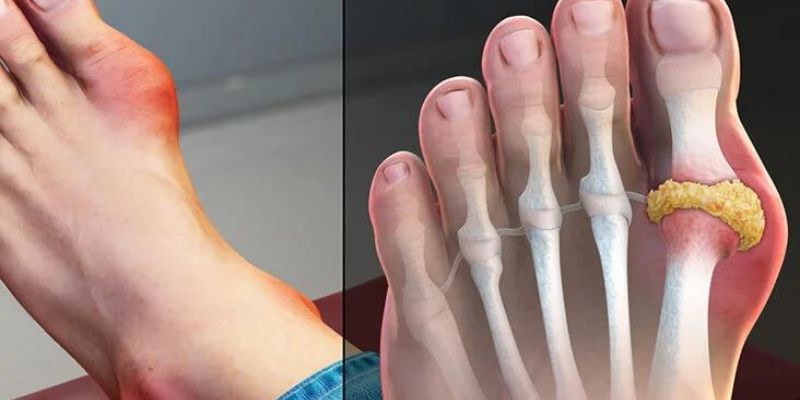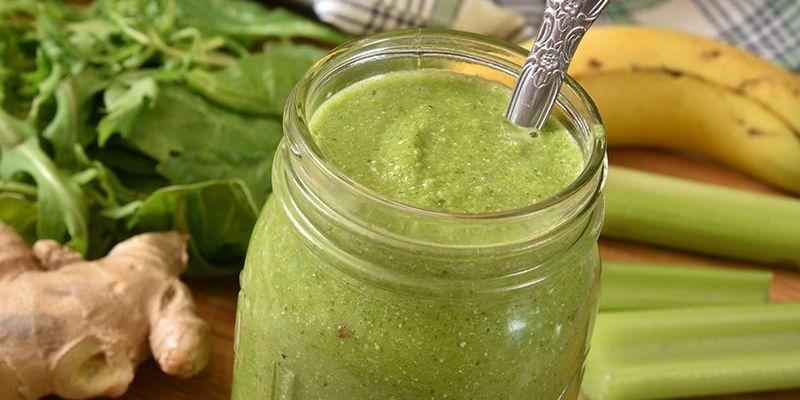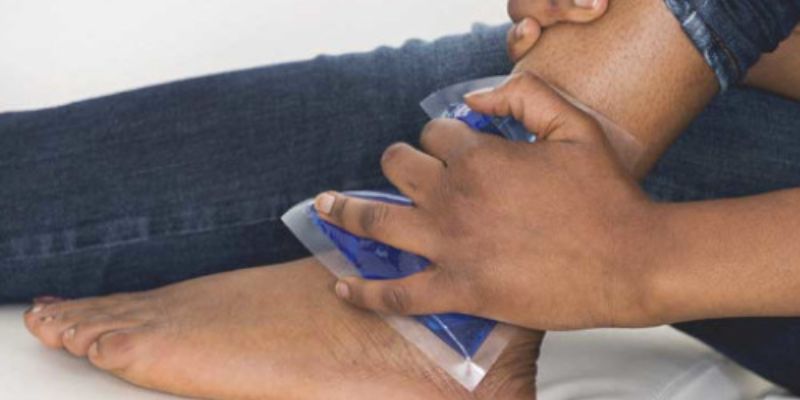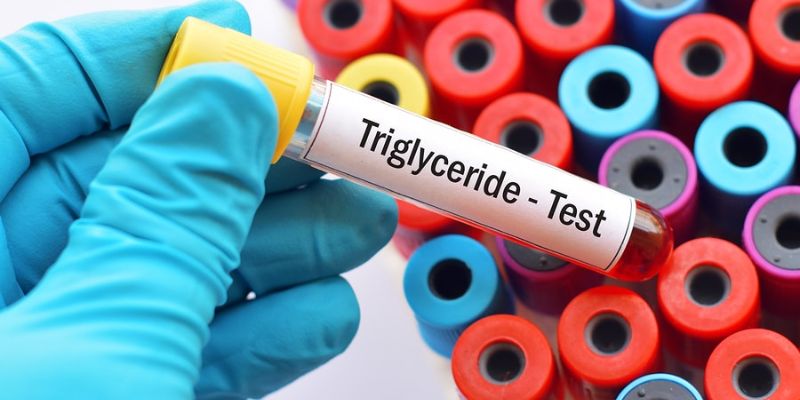Are you looking for a way to quickly manage and soothe the pain of gout flare-ups? If so, you'll be happy to know that several simple yet effective strategies can help bring relief.
Whether trying over-the-counter treatments or changing your diet, this post will provide all the tools to identify triggers and treat gout symptoms before they become unbearable.
Keep reading to learn how to use natural methods and lifestyle changes to significantly reduce gout attacks.
Ways to Reduce Gout Pain Quickly

1. Over-the-Counter Treatments
Nonsteroidal anti-inflammatory drugs (NSAIDs) can quickly reduce gout pain and swelling. Examples of NSAIDs include ibuprofen, naproxen, and aspirin.
However, it's important to note that these medications may cause side effects such as stomach upset, heartburn, or abdominal pain. Talk with your doctor before taking any over-the-counter medications for your gout flare-ups.
2. Ice application
Applying a cold pack or ice wrapped in a cloth directly onto the affected area can help lessen the inflammation and pain associated with a gout flare-up.
Applying the cold pack every two to three hours for 15 minutes is best.
3. Elevation
Placing the affected joint above your heart level can help reduce pain and inflammation associated with a gout attack. Remember that you should only do this if it's comfortable enough and does not cause additional pain or discomfort.
4. Compression
Improving blood circulation to the affected area and reducing fluid buildup around the joint, compression stockings, or wrapping the affected area with an elastic bandage helps minimize swelling brought on by gout flares.
It's important to note that this must be done carefully to not interfere with your range of motion or cause further discomfort.
5. Massage
Massaging the affected area can help reduce pain and stiffness associated with gout flare-ups. However, being gentle when doing this is important, as it could aggravate the joint or cause further discomfort.
6. Taking a Warm Bath
A warm bath is an excellent way to reduce inflammation and pain associated with gout attacks, as it increases blood circulation to the affected area and encourages the relaxation of tense muscles surrounding the joint.
It is best to use lukewarm water for 15 minutes at a time, up to three times daily.
7. Exercise
Exercising regularly can help improve your overall health and lessen your risk of recurrent gout flare-ups. It's important to note that you should consult with your doctor before starting any exercise program, as some activities may exacerbate your gout symptoms.
8. Dietary Changes
Making dietary changes can also help reduce the frequency and severity of gout attacks by limiting foods high in purines, such as red meat, organ meats, and seafood.
Additionally, avoiding alcohol consumption or reducing it significantly may also be beneficial in preventing recurrent gout flares.
9. Prescription Treatments
Your doctor may also prescribe medications to reduce the frequency and severity of gout flares. The most commonly used treatments include colchicine, allopurinol, and probenecid.
These medications work by reducing the amount of uric acid in your body, which is a key factor in causing gout attacks.
It's important to speak with your doctor about potential side effects associated with these medications before starting any treatment plan.
10. Supplements
Certain supplements, such as fish oil and cherry extract, may also help reduce the frequency and severity of gout flare-ups.
It's best to consult your doctor before taking any supplements to ensure they won't interfere with other medications you are taking or cause any potential side effects.
By following these simple strategies, you can effectively manage and soothe the pain associated with gout flare-ups quickly and naturally. Remember to talk to your doctor if your symptoms persist or worsen to determine the best treatment.
Home Remedies for Instant Gout Relief

1. Apply cold or hot compresses
Cold and hot compresses temporarily relieve gout inflammation. To make a cold compress, wrap a few ice cubes in a clean cloth for 10 minutes, several times daily.
For hot compresses, soak a towel in warm water and gently apply it to the discomfort area before replacing it with another one when the heat dissipates.
2. Soak your feet
An Epsom salt foot bath effectively reduces swelling and relieves your body of toxins that have built up due to gout flare-ups.
Add two cups of Epsom salts into three quarts of warm water and soak your feet for 20 minutes daily until the flare-up subsides.
3. Take an anti-inflammatory supplement
Anti-inflammatory supplements like fish oil and turmeric contain essential fatty acids that help reduce inflammation caused by gout attacks. It's best to consult your doctor before taking any supplement and discuss the dosage and potential side effects.
4. Increase water intake
Drinking plenty of water helps flush uric acid from the body, reducing the risk of future gout flare-ups.
Try to drink between 8-10 glasses a day—this will keep your body hydrated and help regulate kidney function, which is important for eliminating toxins from the body.
5. Avoid triggers
Review your diet and look for potential triggers like alcohol, seafood, and red meat that could aggravate gout. Avoid these items during flare-ups, as they can trigger further inflammation and pain.
Natural remedies and lifestyle changes can significantly reduce your risk of painful gout attacks. Incorporating these strategies into your daily routine is a great way to stay one step ahead of future flare-ups and keep your body healthy in the long run.
What Can You Take for Severe Gout Pain?
When it comes to treating severe gout pain, various options are available. Over-the-counter medications such as ibuprofen, naproxen sodium, and ketoprofen can help alleviate gout symptoms by reducing inflammation.
However, these medications should only be used under a doctor's or pharmacist's direction and should be taken for at most 10 days in a row.
Many natural remedies have been proven to reduce gout symptoms for those looking for an alternative route.
Tart cherries, ginger, turmeric, and apple cider vinegar all contain anti-inflammatory properties, which can be beneficial when relieving pain caused by gout flare-ups.
Additionally, increasing your intake of omega-3 fatty acids has been shown to ease joint pain and inflammation.
Finally, lifestyle changes can also be beneficial in reducing gout symptoms. Regular exercise in your daily routine will help reduce stress levels and promote healthy weight management.
Additionally, avoiding foods high in purines (such as red meat, organ meat, shellfish, and alcohol) can help to reduce the risk of gout attacks.
FAQs
What stops gout pain immediately?
Over-the-counter medications such as ibuprofen, colchicine, and naproxen can help reduce inflammation and pain associated with gout flare-ups. While these are not permanent solutions, they can provide quick relief to minimize the discomfort caused by gout.
How do I prevent gout?
Lifestyle changes such as modifying your diet and exercising regularly can help reduce the risk of developing gout. Additionally, avoiding certain foods like red meat, shellfish, alcohol, and sugary drinks can also help lower uric acid levels in the body, which will lessen the chances of having a gout attack.
What is the best way to treat gout attacks?
Making diet and lifestyle changes, such as avoiding foods high in purines, exercising regularly, and maintaining a healthy weight, can help reduce the frequency and intensity of gout attacks.
Conclusion
Managing gout flare-ups doesn't have to be a stressful ordeal. By utilizing natural methods and lifestyle changes, you can identify triggers and reduce attacks before they become unbearable. Don't let gout take control of your life - start incorporating these tips today and find relief!




